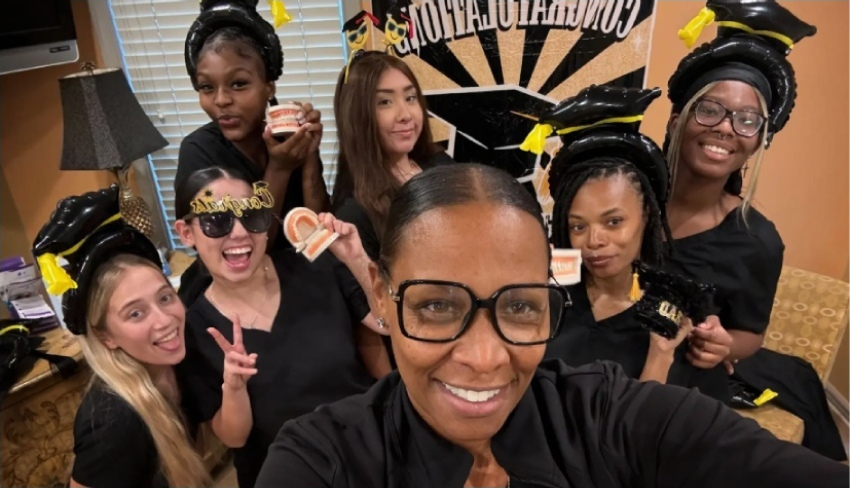Why Aspiring Dental Assistants in Colorado Springs Need 12 Weeks of Training — Not 10
If you’re considering a new career as a dental assistant in Colorado Springs, one of your first big decisions will be selecting the right training program. While some schools offer fast-track, 10-week courses that promise a quicker path to the workforce, cutting corners on your education can leave you unprepared for the real challenges of the job.
At Colorado Springs Dental Assistant School, we believe that 12 weeks of training strikes the right balance. It allows students the time to absorb information, practice real-world procedures, and develop confidence before entering the workforce. Here are five key reasons why a 12-week program is the better choice for aspiring dental assistants in Colorado Springs.
1. It Takes Time to Learn Both Online and In-Person
Dental assisting combines academic learning with practical skills. Through online coursework, students explore core topics like dental terminology, infection control, anatomy, and patient care. But those lessons are just the beginning—students also need time to apply what they’ve learned through hands-on experience.
Colorado Springs Dental Assistant School’s 12-week schedule gives students room to grow at a comfortable pace. Online modules are spread out to avoid information overload, while in-person labs allow students to apply their knowledge in a real dental office setting. A 10-week course often compresses both the academic and practical learning experience, making it difficult for students to keep up or feel truly prepared.
2. Students Need Real Experience in a Real Dentist’s Office
Dental assistants don’t work in classrooms—they work chairside, assisting during procedures and supporting patient care. To prepare for that environment, students need hands-on experience in an actual dental office, not just practice on plastic models or in simulated labs.
That’s why our 12-week program includes in-person training in a real dental clinic. At Colorado Springs Dental Assistant School, students perform tasks like suctioning, instrument transfer, tray setup, and sterilization—just like they will on the job. The extended schedule allows students to grow comfortable and confident in the clinic, something that can’t be rushed in a condensed 10-week program.
3. The Dental Field Is Changing—Students Should Be Ready
Dental technology continues to evolve, and today’s dental assistants must be able to keep up. From digital charting and X-rays to updated infection control procedures and cosmetic treatments, modern clinics are looking for assistants who are tech-savvy and adaptable.
With a 12-week schedule, our instructors have time to cover current tools and emerging trends. Students learn not only traditional techniques, but also how to use the latest dental equipment and software. At Colorado Springs Dental Assistant School, we make sure students are prepared for both the job they’ll start tomorrow and the industry changes they’ll encounter in the years ahead.
A shorter course might get you into the workforce faster, but it may not equip you with the future-ready skills employers expect. That’s a risk you don’t have to take with a longer, more comprehensive program.
4. Certification Exams Require More Than a Quick Review
For many aspiring dental assistants, passing a certification exam is a necessary step toward employment. These exams assess your knowledge of clinical procedures, radiography, infection control, and more. Success depends on more than just familiarity—it requires mastery and confidence.
Colorado Springs Dental Assistant School’s 12-week program builds in time for thorough exam preparation. Students review key concepts, take practice tests, and receive support from instructors to strengthen areas of difficulty. This slow-and-steady approach reduces stress and increases your chances of passing on the first try.
In contrast, many 10-week programs rush through material, leaving little time to properly prepare. Students often finish those programs feeling underprepared for certification—and unready for their first job.
5. Key Skills Can’t Be Rushed—They Need Repetition
Dental assisting is hands-on work, and it takes time to master the daily responsibilities of the job. Tasks like assisting during fillings, maintaining moisture control, using suction, and preparing composite materials are all skills that require practice—lots of it.
In our 12-week program, students revisit these key skills multiple times, gradually building muscle memory and confidence. Each lab session offers opportunities to practice, receive feedback, and improve. At Colorado Springs Dental Assistant School, we don’t expect students to master everything on the first try—we give them the time and space to learn properly.
A 10-week program simply doesn’t allow enough repetition. Skills that are rushed or only practiced once won’t feel natural when it’s time to apply them in a real dental office. That’s why more time equals better preparation.
Build Your Career with Colorado Springs Dental Assistant School
At Colorado Springs Dental Assistant School, we’ve designed our 12-week training program to set you up for long-term success. Our flexible format combines online learning with in-person training in a real dental office, led by experienced instructors who care about your growth. You’ll graduate with the knowledge, practical skills, and confidence to enter the workforce and thrive.
Don’t settle for a quick course that leaves you feeling unprepared. Choose the training experience that prepares you for real opportunities in the dental field. Contact Colorado Springs Dental Assistant School today to learn how our 12-week program can help you begin a rewarding new career.
You're 12 weeks from the dental assistant career you deserve.
